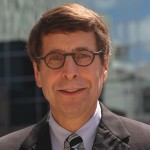
Touro pharmacy students worked with patients during the Harlem Healthy Soul Festival in September 2015.
A NON-TRADITIONAL “2+2” CURRICULUM at the Touro School of Pharmacy in Harlem, N.Y., is paying big dividends for students and their future employers. Founded in 2008, Touro has differentiated itself by requiring students to spend twice the amount of typical time in clinical rotations during their four-year Pharm.D. experience.
Traditional “3+1” pharmacy programs designate a single year for clinical rotations after three years of coursework.
Touro’s “2+2” curriculum, modeled on medical school education, offers two years of classroom instruction followed by two years of clinical experience. The expanded exposure to real-world practice creates more opportunities for students to impress potential employers and helps them narrow their postgraduate and professional options.
“The additional rotations helped me discover my professional interests, fine-tune my career plans, and ultimately decide that I wanted to pursue an academic career,” said Emmanuel Knight, Pharm.D., a 2015 Touro graduate and now an academic fellow at the school.
“And if you make an impact at a clinical site, they’re more likely to consider you for residencies, fellowships, and jobs.”
Pharmacy Immersion Helps Chart Professional Paths
During the two-year clinical component, students complete six-week rotations at affiliate sites to learn first-hand about areas such as ambulatory care, general medicine, and institutional and community pharmacy practice. To pack the equivalent of six semesters of coursework into just four terms, Touro’s semesters last 19 weeks instead of the usual 13 to 15 weeks.

Tova Berman
Tova Berman, a third-year pharmacy student, noted that the early immersion in fieldwork allowed her to map out a professional path with greater confidence.
“By starting my clinical rotations in my P3 year, I have been able to think about my future pharmacy career in much more concrete terms,” said Berman. “Also, while classroom learning is an extremely important component of our education, experiencing hands-on clinical work at an early stage has helped bring the material to life. I see it for myself on a daily basis: various illnesses, medication management, and how pharmacists play an integral role in patient care.”
Touro stresses that every clinical rotation is an opportunity for a potential employer or residency program to assess a student, according to Ronnie Moore, Pharm.D., assistant dean of clinical affairs and associate professor at Touro. The augmented rotation timetable also gives students a chance to repeat rotations at desired clinical sites.
“The extra time that students spend on rotation gives the staff at those sites a good gauge on students’ individual capabilities,” Dr. Moore said, adding that the amount of information that students retain grows exponentially in an actual practice setting.
By the second half of their third year, he added, most students are already honing in on a particular practice area. They also still have plenty of time left to choose additional rotations that best prepare them to meet their goals.
That was true for Touro alumnus Michelle Friedman, Pharm.D. When Dr. Friedman began pharmacy school, she had intended to become a community pharmacist. But during her second year of clinical work, she gravitated toward clinical pharmacy. After graduation and two years of residency, Dr. Friedman became a clinical faculty member at Touro and a preceptor at Kingsbrook Jewish Medical Center, Brooklyn, N.Y., for students who are completing their internal medicine rotations.
“My early rotations opened my eyes to new experiences and helped me decide what I wanted to do,” she said. “What I’m doing today is the best of both worlds for me because I love teaching, and I love clinical pharmacy.”
A Commitment to Public Health, Service
Organizations that hire Touro graduates say they, too, benefit from students’ additional clinical exposure.
“The Touro student we hired had already completed multiple rotations with us,” said Hinnah Farooqi, Pharm.D., director of pharmacy at Harlem Hospital Center. “She became familiar with our staff and our work environment, which shortened her training time and helped her become readily accepted as a colleague.”

Touro students participated in the American Hearth Association Heart and Stroke Walk in September 2015.
Another facet of Touro’s hands-on ethos is the school’s curricular obligation to public health and community service.
“We strongly believe that a student’s education is greatly enhanced when it reaches beyond the four walls of the school into the surrounding community,” said Dr. Moore.
For instance, among their various service work commitments, Berman assisted at an immunization clinic at a local senior center.
Dr. Friedman and fellow students spoke to Staten Island high schoolers about drug abuse, and Dr. Knight helped to set up a volunteer program in which residents at a long-term care facility were transported to and from concerts and religious services.
“We had many opportunities to do those types of things during our last two years when we didn’t have to focus on coursework,” he said. “It allowed me to give something back to the community.”
–By Steve Frandzel









 If you want to contribute tutorials, news or other stuff please contact us. We pay 150 for each approved article.
If you want to contribute tutorials, news or other stuff please contact us. We pay 150 for each approved article. Consectetur adipisicing elit. Sed do eiusmod tempor incididunt ut labore.
Consectetur adipisicing elit. Sed do eiusmod tempor incididunt ut labore. This site uses valid HTML and CSS. All content Copyright © 2010 Newscast, Inc
This site uses valid HTML and CSS. All content Copyright © 2010 Newscast, Inc If you like what we do, please don't hestitate and subscribe to our
If you like what we do, please don't hestitate and subscribe to our